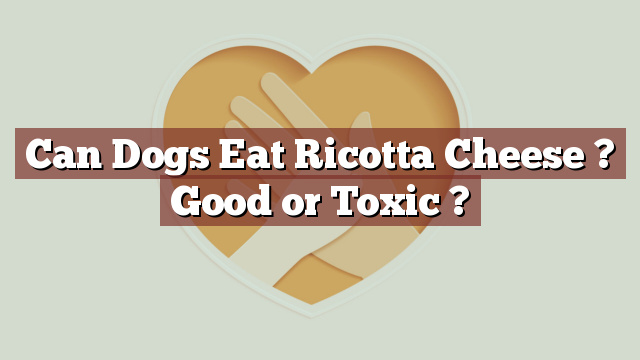Can Dogs Eat Ricotta Cheese? Good or Toxic?
As responsible pet owners, it is important for us to know what foods are safe for our furry friends to consume. Dogs have different dietary requirements compared to humans, and certain foods that may be perfectly fine for us can be harmful or toxic to them. One such food that often raises questions is ricotta cheese. In this article, we will explore whether dogs can safely eat ricotta cheese or if it poses any potential risks to their health.
Nutritional Value of Ricotta Cheese: What Does it Contain?
Ricotta cheese is a popular ingredient in many human dishes, known for its creamy texture and mild flavor. It is made from the whey leftovers during the production of other cheeses. Ricotta cheese is a good source of protein, calcium, vitamin A, and vitamin B12. It also contains trace amounts of other vitamins and minerals.
Can Dogs Eat Ricotta Cheese? Is it Safe or Toxic?
No, dogs should not eat ricotta cheese. While ricotta cheese is not considered toxic to dogs, it can still cause digestive issues and discomfort. Dogs are lactose intolerant, meaning they lack the necessary enzymes to properly digest lactose, which is the sugar found in milk and dairy products. Consuming ricotta cheese can lead to gastrointestinal problems such as diarrhea, gas, and bloating in dogs.
Potential Risks and Benefits of Ricotta Cheese for Dogs
Although ricotta cheese is not toxic to dogs, it is not a recommended food for them. The high lactose content in ricotta cheese can lead to digestive upset and contribute to obesity in dogs. Additionally, the high fat content in cheese can also lead to pancreatitis, a potentially serious condition in dogs.
On the other hand, there are no significant health benefits that ricotta cheese provides specifically for dogs. Dogs have different nutritional needs compared to humans, and their diet should primarily consist of balanced dog food that meets all their dietary requirements.
My Dog Ate Ricotta Cheese, What Should I Do?
If your dog accidentally consumes a small amount of ricotta cheese, there is probably no need to panic. However, it is important to monitor your dog for any signs of digestive discomfort such as diarrhea, vomiting, or excessive gas. If these symptoms persist or worsen, it is recommended to contact your veterinarian for further guidance.
Conclusion: Moderation and Consultation are Key
In conclusion, dogs should not be given ricotta cheese as it can lead to digestive issues and potential health risks. While a small amount of ricotta cheese may not be immediately harmful, it is best to err on the side of caution and avoid feeding it to your furry friend. If you have any concerns or questions regarding your dog’s diet, it is always advisable to consult with a veterinarian who can provide professional guidance tailored to your dog’s specific needs. Remember, the key to a healthy and happy dog is a balanced and appropriate diet.
Thank you for investing your time in exploring [page_title] on Can-Eat.org. Our goal is to provide readers like you with thorough and reliable information about various dietary topics. Each article, including [page_title], stems from diligent research and a passion for understanding the nuances of our food choices. We believe that knowledge is a vital step towards making informed and healthy decisions. However, while "[page_title]" sheds light on its specific topic, it's crucial to remember that everyone's body reacts differently to foods and dietary changes. What might be beneficial for one person could have different effects on another. Before you consider integrating suggestions or insights from "[page_title]" into your diet, it's always wise to consult with a nutritionist or healthcare professional. Their specialized knowledge ensures that you're making choices best suited to your individual health needs. As you navigate [page_title], be mindful of potential allergies, intolerances, or unique dietary requirements you may have. No singular article can capture the vast diversity of human health, and individualized guidance is invaluable. The content provided in [page_title] serves as a general guide. It is not, by any means, a substitute for personalized medical or nutritional advice. Your health should always be the top priority, and professional guidance is the best path forward. In your journey towards a balanced and nutritious lifestyle, we hope that [page_title] serves as a helpful stepping stone. Remember, informed decisions lead to healthier outcomes. Thank you for trusting Can-Eat.org. Continue exploring, learning, and prioritizing your health. Cheers to a well-informed and healthier future!

